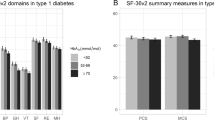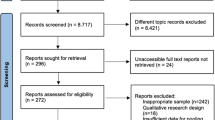Abstract
Objective: To analyse how type 1 diabetes mellitus (DM) and the symptoms of its chronic long-term complications correlate with health status domains in the adult population in Finland.
Methods: A representative sample of patients with type 1 DM was selected randomly from the Finnish drug reimbursement registry. Participants reported symptoms, diagnoses and treatments indicating the presence and time of appearance of long-term complications, and completed the RAND 36 questionnaire. A principal component analysis was performed to compress the eight RAND 36 dimensions into composite domains of health status. The results were validated with split-sample analysis. Regression analyses were used to estimate the effects of age, sex, symptoms of long-term complications and comorbidities on the component T-scores.
Results: Of the 752 (70.8%) responders, 592 fulfilled the criteria of type 1 DM. Of these, 82.6% fully completed the RAND 36 questionnaire. Principal component analysis of our data supports the theory of the 2-factor model of health, as physical and mental health domains were reflected unambiguously by different RAND 36 dimensions. The regression results show that the symptoms of longterm complications correlate more strongly with the physical than the mental domain of health status.
Conclusion: Type 1 DM, and especially the symptoms of its long-term complications, correlate mainly with the physical domain of health, although the mental domain is also affected. The prevalence of long-term complications with type 1 DM is sufficiently high within the Finnish population to substantially influence the health status of people with type 1 DM.








Similar content being viewed by others
References
Podar T, Solntsev A, Karvonen M, et al. Increasing incidence of childhood-onset type I diabetes in 3 Baltic countries and Finland 1983–1998. Diabetologia 2001; 44 Suppl. 3: B17–B20
Onkamo P, Väänänen S, Karvonen M, et al. Worldwide increase in incidence of type I diabetes: the analysis of the data on published incidence trends. Diabetologia 1999; 42: 1395–1403
Simell IT, Sintonen H, Hahl J, et al. Costs of insulin-dependent diabetes mellitus. Pharmacoeconomics 1996; 9: 24–38
Lounamaa R. Mortality in Finnish patients with insulin-dependent diabetes mellitus: a follow-up study of patients diagnosed when under twenty years of age. ML: 126. Helsinki: Social Insurance Institution, 1993
Borch-Johnsen K, Kreiner S, Deckert T. Mortality of type 1 (insulin-dependent) diabetes mellitus in Denmark: a study of relative mortality in 2930 Danish type 1 diabetic patients diagnosed from 1933 to 1972. Diabetologia 1986; 29: 767–772
Dorman JS, LaPorte RE, Kuller LH, et al. The Pittsburgh insulin-dependent diabetes mellitus (IDDM) morbidity and mortality study. Diabetes 1984; 33: 271–276
Green A, Borch-Johnsen K, Andersen KP, et al. Relative mortality of type 1 (insulin-dependent) diabetes in Denmark: 1933–1981. Diabetologia 1985; 28: 339–342
Hart HE, Bilo HJG, Redekop WK, et al. Quality of life of patients with type I diabetes mellitus. Qual Life Res 2003; 12: 1089–1097
Tabaei BP, Shill-Novak J, Brandle M, et al. Glycemia and the quality of well-being in patients with diabetes. Qual Life Res 2004; 13: 1153–1161
Hahl J, Hämäläinen H, Sintonen H, et al. Health-related quality of life in type 1 diabetes without or with symptoms of long-term complications. Qual Life Res 2002; 11: 427–436
Nordfeldt S, Jonsson D. Short-term effects of severe hypoglycaemia in children and adolescents with type 1 diabetes: a cost-of-illness study. Acta Paediatr 2001; 90: 13742
Sureshkumar KK, Mubin T, Mikhael N, et al. Assessment of quality of life after simultaneous pancreas-kidney transplantation. Am J Kidney Dis 2002; 39: 1300–1306
Fryback DG, Lawrence WF, Martin PA, et al. Predicting quality of well-being scores from the SF-36: results from the Beaver Dam Health Outcomes Study. Med Decis Making 1997; 17: 1–9
Taylor MD, Frier BM, Gold AE, et al. Psychosocial factors and diabetes-related outcomes following diagnosis of type 1 diabetes in adults: The Edinburgh Prospective Diabetes Study. Diabet Med 2003; 20: 135–146
Linkeschova R, Raoul M, Bott U, et al. Less severe hypoglycaemia, better metabolic control, and improved quality of life in type 1 diabetes mellitus with continuous subcutaneous insulin infusion (CSII) therapy: an observational study of 100 consecutive patients followed for a mean of 2 years. Diabet Med 2002; 19: 746–751
Bruttomesso D, Pianta A, Crazzolara D, et al. Continuous subcutaneous insulin infusion (CSII) in the Veneto region: efficacy, acceptability and quality of life. Diabet Med 2002; 19: 628–634
The DAFNE study group. Training in flexible, intensive insulin management to enable dietary freedom in people with type 1 diabetes: dose adjustment for normal eating (DAFNE) randomised controlled trial. BMJ 2002; 325: 746–751
Weinger K, Jacobson AM. Psychosocial and quality of life correlates of glycemic control during intensive treatment of type 1 diabetes. Patient Educ Couns 2001; 42: 123–131
Hoey H, Aanstoot H-J, Chiarelli F, et al. Good metabolic control is associated with better quality of life in 2101 adolescents with type 1 diabetes. Diabetes Care 2001; 24: 1923–1928
Tamas G, Marre M, Astorga R, et al. Glycaemic control in type 1 diabetic patients using optimised insulin as part or human insulin in a randomised multinational study. Diabetes Res Clin Pract 2001; 54: 105–114
Cox DJ, Gonder-Frederick L, Polonsky W, et al. Blood glucose awareness training (BGAT-2): long-term benefits. Diabetes Care 2001; 24: 637–642
Gross CR, Limwattananon C, Matthees B, et al. Impact of transplantation on quality of life in patients with diabetes and renal dysfunction. Transplantation 2000; 70: 1736–1746
Lloyd CE, Orchard TJ. Physical and psychological well-being in adults with type 1 diabetes. Diabetes Res Clin Pract 1999; 44: 9–19
Epidemiology of diabetes interventions and complications (EDIC): design, implementation, and preliminary results of a long-term follow-up of the Diabetes Control and Complications Trial cohort. Epidemiology of Diabetes Interventions and Complications (EDIC) Research Group. Diabetes Care 1999; 22: 99-111
Hermann BP, Vickrey B, Hays J, et al. A comparison of health-related quality of life in patients with epilepsy, diabetes and multiple sclerosis. Epilepsy Res 1996; 25: 113–118
Keinänen-Kiukaanniemi S, Ohinmaa A, Pajunpää P, et al. Health related quality of life in diabetic patients measured by the Nottingham Health Profile. Diabet Med 1995; 13: 382–388
Klein BEK, Klein R, Moss SE. Self-rated health and diabetes of long duration. Diabetes Care 1998; 21: 236–240
Influence of intensive diabetes treatment on quality-of-life outcomes in the diabetes control and complications trial: the Diabetes Control and Complications Trial Research Group. Diabetes Care 1996; 19: 195-203
Wu S-Y, Sainfort F, Tomar RH, et al. Development and application of a model to estimate the impact of type 1 diabetes on health-related quality of life. Diabetes Care 1998; 21: 725–731
Wikblad K, Leksell J, Wibell L. Health-related quality of life in relation to metabolic control and late complications in patients with insulin dependent diabetes mellitus. Qual Life Res 1996; 5: 123–130
Wändell PE, Brorsson B, Åberg H. Quality of life in diabetic patients registered with primary health care services in Sweden. Scand J Prim Health Care 1997; 15: 97–102
Aalto A-M, Uutela A, Aro AR. Health related quality of life among insulin-dependent diabetics: disease-related and psychosocial correlates. Patient Educ Couns 1997; 30: 215–225
Jacobson AM, de Groot M, Samson JA. The effects of psychiatric disorders and symptoms on quality of life in patients with type I and type II diabetes mellitus. Qual Life Res 1997; 6: 11–20
Kohen D, Burgess AP, Catalan J, et al. The role of anxiety and depression in quality of life and symptom reporting in people with diabetes mellitus. Qual Life Res 1998; 7: 197–204
Piehlmeier W, Bullinger M, Kirchberger I, et al. Evaluation of the quality of life of patients with insulin-dependent diabetes mellitus before and after organ transplantation with the SF 36 health survey. Eur J Surg 1996; 162: 933–940
Kiebert GM, van Oosterhout EC, van Bronswijk H, et al. Quality of life after combined kidney-pancreas or kidney transplantation in diabetic patients with end-stage renal disease. Clin Trasplant 1994; 8: 239–245
Bott U, Mühlhauser I, Overmann H, et al. Validation of a diabetes-specific quality-of-life scale for patients with type 1 diabetes. Diabetes Care 1998; 21: 757–769
Bradley C, Todd C, Gorton T, et al. The development of an individualized questionnaire measure of perceived impact of diabetes on quality of life: the ADDQoL. Qual Life Res 1999; 8: 79–91
Hammond GS, Aoki IT. Measurement of health status in diabetic patients: diabetes impact measurement scales. Diabetes Care 1992; 15: 469–477
Jacobson AM, de Groot M, Samson JA. The evaluation of two measures of quality of life in patients with type I and type II diabetes. Diabetes Care 1994; 17: 267–274
Kotsanos JG, Vignati L, Huster W, et al. Health-related quality-of-life results from multinational clinical trials of insulin lispro: assessing benefits of a new diabetes therapy. Diabetes Care 1997; 20: 948–958
Meadows K, Steen N, McColl E, et al. The Diabetes Health Profile (DHP): a new instrument for assessing the psychosocial profile of insulin-requiring patients. Development and psychometric evaluation. Qual Life Res 1996; 5: 242–254
Boyer JG, Earp JA. The development of an instrument for assessing the quality of life of people with diabetes. Med Care 1997; 35: 440–453
Garrat AM, Schmidt L, Fitzpatrick R. Patient-assessed health outcome measures for diabetes: a structured review. Diabet Med 2002; 19: 1–11
Brazier J. The SF-36 health survey questionnaire: a tool for economists. Health Econ 1993; 2 (3): 213–215
Bradley C. Measuring quality of life in diabetes. In: Marshall SM, Home PD, Rizza RA, editors. The diabetes annual/10. Amsterdam: Elsevier Science BV, 1996: 207–224
Aalto A-M, Aro AR, Teperi J.R AND-36 as a measure of health-related quality of life: reliability, construct validity and reference values in the Finnish general population [in Finnish with English summary]. Helsinki: Stakes, Research Reports 101, 1999
Hays RD, Sherbourne CD, MazelR. The RAND 36-item Health Survey 1.0. Health Econ 1993; 2: 217–227
Alonso J, Ferrer M, Gandek B, et al. Health-related quality of life associated with chronic conditions in eight countries: results from the International Quality of Life Assessment (IQOLA) project. Qual Life Res 2004; 13: 283–298
Cunningham WE, Nakazono IT, Tsai KL, et al. Do differences in methods for constructing SF-36 physical and mental health summary measures change their association with chronic m:xlical conditions and utilization? Qual Life Res 2003; 12: 1029–1035
Samsa G, Edelman D, Rothman ML, et al. Determining clinically important differences in health status measures: a general approach with illustration to the Health Utilities Index Mark II. Pharmacoeconomics 1999; 15: 141–155
Ware IE, Kosinski M, Bayliss MS, et al. Comparison of methods for the scoring and statistical analysis of SF-36 health profile and summary measures: summary of results from the Medical Outcomes Study. Med Care 1995; 33: AS264–AS279
SPSS Inc. SPSS Base 9.0 users guide. Chicago: SPSS Inc., 1999
Hair IF Jr, Anderson RE, Tatham RL, et al. Multivariate data analysis with readings. Englewood Cliffs (NJ): Prentice-Hall, 2001
Acknowledgements
This study was supported by the Yrjö Jahnsson Foundation; STAKES/FinOHTA; the Foundation for Economic Education; the Oskar Öflund Foundation; the Juvenile Diabetes Research Foundation International (grant # 4-1999-731 to O. Simell); the Diabetes Research Foundation, Finland; the Signe and Ane Gyllenberg Foundation, Päivikki; the Sakari Sohlberg Foundation; and the Turku School of Economics and Business Administration.
The questionnaire specific to this study was constructed by J. Hahl, H. Hämäläinen, T. Simell and O. Simell.
H. Hämäläinen was responsible for generating the study samples and administering the data-gathering and management processes in the Social Insurance Institute.
J. Hahl was responsible for statistical analysis and had primary responsibility for writing the manuscript. All other listed authors were co-authors.
H. Hämäläinen and O. Simell provided medical support throughout the whole process.
The authors have no conflicts of interest relevant to the content of this article.
Author information
Authors and Affiliations
Corresponding author
Rights and permissions
About this article
Cite this article
Hahl, J., Hämäläinen, H., Simell, T. et al. The Effects of Type 1 Diabetes and its Long-Term Complications on Physical and Mental Health Status. Pharmacoeconomics 24, 559–569 (2006). https://doi.org/10.2165/00019053-200624060-00004
Published:
Issue Date:
DOI: https://doi.org/10.2165/00019053-200624060-00004




